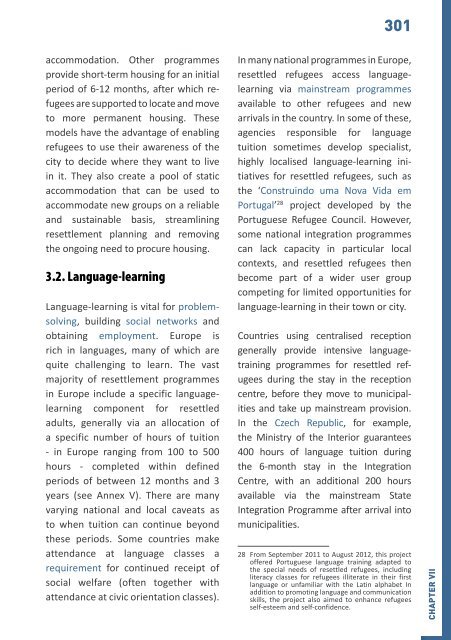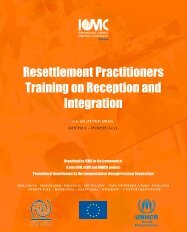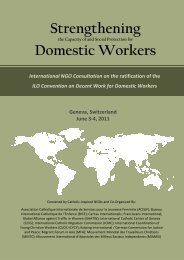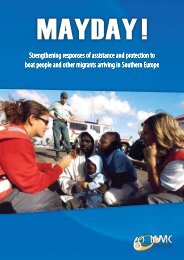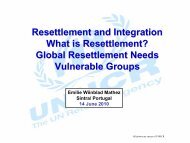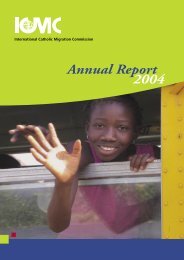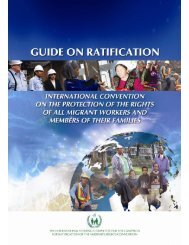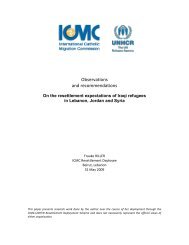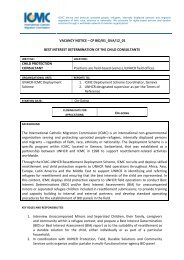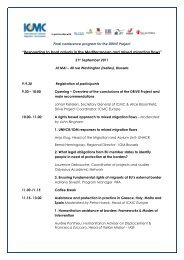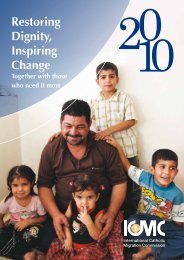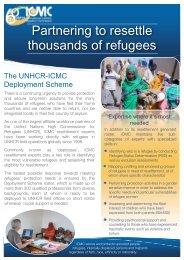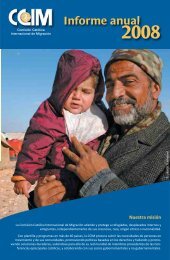ICMCEUROPE WelcometoEurope.pdf (5.89 MB)
ICMCEUROPE WelcometoEurope.pdf (5.89 MB)
ICMCEUROPE WelcometoEurope.pdf (5.89 MB)
Create successful ePaper yourself
Turn your PDF publications into a flip-book with our unique Google optimized e-Paper software.
301<br />
accommodation. Other programmes<br />
provide short-term housing for an initial<br />
period of 6-12 months, after which refugees<br />
are supported to locate and move<br />
to more permanent housing. These<br />
models have the advantage of enabling<br />
refugees to use their awareness of the<br />
city to decide where they want to live<br />
in it. They also create a pool of static<br />
accommodation that can be used to<br />
accommodate new groups on a reliable<br />
and sustainable basis, streamlining<br />
resettlement planning and removing<br />
the ongoing need to procure housing.<br />
3.2. Language-learning<br />
Language-learning is vital for problemsolving,<br />
building social networks and<br />
obtaining employment. Europe is<br />
rich in languages, many of which are<br />
quite challenging to learn. The vast<br />
majority of resettlement programmes<br />
in Europe include a specific languagelearning<br />
component for resettled<br />
adults, generally via an allocation of<br />
a specific number of hours of tuition<br />
- in Europe ranging from 100 to 500<br />
hours - completed within defined<br />
periods of between 12 months and 3<br />
years (see Annex V). There are many<br />
varying national and local caveats as<br />
to when tuition can continue beyond<br />
these periods. Some countries make<br />
attendance at language classes a<br />
requirement for continued receipt of<br />
social welfare (often together with<br />
attendance at civic orientation classes).<br />
In many national programmes in Europe,<br />
resettled refugees access languagelearning<br />
via mainstream programmes<br />
available to other refugees and new<br />
arrivals in the country. In some of these,<br />
agencies responsible for language<br />
tuition sometimes develop specialist,<br />
highly localised language-learning initiatives<br />
for resettled refugees, such as<br />
the ‘Construindo uma Nova Vida em<br />
Portugal’ 28 project developed by the<br />
Portuguese Refugee Council. However,<br />
some national integration programmes<br />
can lack capacity in particular local<br />
contexts, and resettled refugees then<br />
become part of a wider user group<br />
competing for limited opportunities for<br />
language-learning in their town or city.<br />
Countries using centralised reception<br />
generally provide intensive languagetraining<br />
programmes for resettled refugees<br />
during the stay in the reception<br />
centre, before they move to municipalities<br />
and take up mainstream provision.<br />
In the Czech Republic, for example,<br />
the Ministry of the Interior guarantees<br />
400 hours of language tuition during<br />
the 6-month stay in the Integration<br />
Centre, with an additional 200 hours<br />
available via the mainstream State<br />
Integration Programme after arrival into<br />
municipalities.<br />
28 From September 2011 to August 2012, this project<br />
offered Portuguese language training adapted to<br />
the special needs of resettled refugees, including<br />
literacy classes for refugees illiterate in their first<br />
language or unfamiliar with the Latin alphabet In<br />
addition to promoting language and communication<br />
skills, the project also aimed to enhance refugees<br />
self-esteem and self-confidence.<br />
CHAPTER VII


